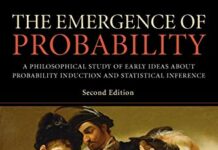
Ebook Info
- Published: 2001
- Number of pages: 322 pages
- Format: PDF
- File Size: 19.44 MB
- Authors: Ian Hacking
Description
This is an introductory 2001 textbook on probability and induction written by one of the world’s foremost philosophers of science. The book has been designed to offer maximal accessibility to the widest range of students (not only those majoring in philosophy) and assumes no formal training in elementary symbolic logic. It offers a comprehensive course covering all basic definitions of induction and probability, and considers such topics as decision theory, Bayesianism, frequency ideas, and the philosophical problem of induction. The key features of this book are a lively and vigorous prose style; lucid and systematic organization and presentation of ideas; many practical applications; a rich supply of exercises drawing on examples from such fields as psychology, ecology, economics, bioethics, engineering, and political science; numerous brief historical accounts of how fundamental ideas of probability and induction developed; and a full bibliography of further reading.
User’s Reviews
Reviews from Amazon users which were colected at the time this book was published on the website:
⭐(FOUR AND A HALF STARS)This is more an intro to the PHILOSOPHY of probability and inductive logic than an intro to the MATHEMATICS of probability of inductive logic, although some of the basic mathematical ideas are covered (which is useful if you’re gonna discuss the philosophy). Do not get this book if you’re just looking for a typical mathematical intro to statistics. But DO get this book if you want to know about the foundations of Bayesianism or are interested in the Frequentists vs. Bayesian debate. It is the best intro out there on the Frequentists/Bayesians issue, and it is extremely helpful for someone who is trying to get a handle on Bayesian reasoning. Also, those who are more into the mathematical aspects of probability could find this book useful in giving them a wider perspective on the subject. On the whole, it’s clearly written and fun to read, although it is not an “easy” book. A basic knowledge of probability theory and some initial grasp of induction are good to have before reading this. But overall, it’s highly recommended for those who want to know about the conceptual underpinnings of probability/induction in general, and Bayesian and Frequentism specifically.
⭐An Introduction to Probability and Inductive Logic is a very good book. The explanations are clear, the examples are lively and the book does a good job of surveying the major points of this very important topic.I wish that other reviewers had stated more clearly that the intended audience is undergraduates. While the book is worth reading for all the reasons given above, as well as others mentioned by other reviewers, those of us with some prior knowledge of mathematical probability theory and its philosophic interpretation will find most of the book contains already well understood material. For example, while I found the responses to Hume’s objections to inductive knowledge very interesting, I did not need a review of the normal distribution, confidence intervals or the Law of Large Numbers. If I were to teach these subjects to bright undergraduates who were not science majors, however, I might use this material.In short, a wonderful book if you keep in mind the intended reader.
⭐I would HIGHLY recommend this book for anyone (including business men) who must make decisions with incomplete information and under uncertainty. Instead of focusing on the mechanics of statistics, it focuses on how to think about risky propositions.I bought this book while working on a particular problem in machine learning, at a point where I had started realizing that I was losing clarity on my definition of probability. I was using the mechanics, but didn’t clearly understand why the use was valid. This seemed an odd and embarrassing circumstance at the time, how could I not understand what “probability” means? As it turns out this confusion is one shared broadly in history of science, and in current applications of statistical mechanics.Prof Hacking’s writing is clear and entertaining, clearly aimed at engaging the reading audience.
⭐I am half way through the book and found it a pleasure to read due to the insights by the author’s clear and concise writing style. I disagree with some other negative reviews. I do a lot of quantitative analysis, but I don’t think everyone needs to see a lot of equations to gain fundamental understanding of the important principles of probability and inductive reasoning. This book has the right balance of philosophical discussions and numerical examples to illustrate what it intends to do: introducing the two subjects. The book does a agreat job explaining the independence, conditional probabilities and the Bayes rule.
⭐This closely reflects my own (college law) teaching style: use the smallest words and simplest examples possible, to start with, and then add on the technical terminology. Starting from a very ad hoc knowledge of logic and probability, and wishing to become formally proficient, I have been digging through various books on these topics to find one remedial enough to suit me (and the more advanced books in my library are thus waiting for later perusal). Bingo! Some highbrows may feel this style is “spoon-fed” or “dumbed down.” However, a good teacher, to my mind, is one who builds a good steady bridge from where the student actually is, to more advanced concepts, and this serves admirably.
⭐I love this book. It is easy to read and provides excellent examples. Not only does it introduce the reader to Bayes’ Theorem, but it also covers various gambler’s fallacies. A nice addition is the lucid philosophical commentary that keeps the reader informed about the various debates about inductive logic that have taken place over the ages. With this book, a beginner can get up-to-date with the theorem (Bayes’) that has recently taken both the philosophy of science and probability worlds by storm.It is great to see a solid logic book for philosophy that is not deductive. Inductive logic is important too!
⭐Keep in mind this is a very introductory text that will have to be supplimented, but it serves it’s purpose well for it’s role for a quick reintroduction to the core concepts or first time encounter.
⭐Offers In-depth understanding of probability despite the title. Content need to be read several times and carefully. Reflections are needed for better understanding of the topics. More appropriate for an audience with interest in science and critical thinking.
⭐It is a good introduction to the topic for undergraduate or for graduate with non-mathematical background. It could also used as a quick reference book in the future. The Kindle version is very good.
⭐El libro llego roto. Es una re-impresión de Amazon de baja calidad. Lo maltrataron en la entrega y se rompió la portada. No pagaría más de 200 pesos por la calidad del producto que entregan. Fotocopias con precio de original. Para algunos libros no me molesta pero para libros de texto u otros realmente voy a pensar si vuelvo a comprar un libro en Amazon. Por lo menos te deberían informar que te están vendiendo una re-impresión y cobrarte un precio justo por eso. Hago varios pedidos de libros por mes y la baja calidad de las impresiones de Amazon me tiene decepcionado.I have had the questionable pleasure of reading many books on the philosophy of probability. This is one of the very best, understandable, concise, yet precise enough to provide real insight. Do not expect an exposure of the more technical aspects of probability theory, but that is not the aim of the book. Probably the best text for an introductory course on probability and inductive logic.
⭐It was perfect. There was no damage at all. It was perfect. Many thanks. I have since come back to buy more books.
⭐A must read for someone who wishes to acquire knowledge about probability. Great tool for undergraduate students. I highly reccomend it.
Keywords
Free Download An Introduction to Probability and Inductive Logic in PDF format
An Introduction to Probability and Inductive Logic PDF Free Download
Download An Introduction to Probability and Inductive Logic 2001 PDF Free
An Introduction to Probability and Inductive Logic 2001 PDF Free Download
Download An Introduction to Probability and Inductive Logic PDF
Free Download Ebook An Introduction to Probability and Inductive Logic

